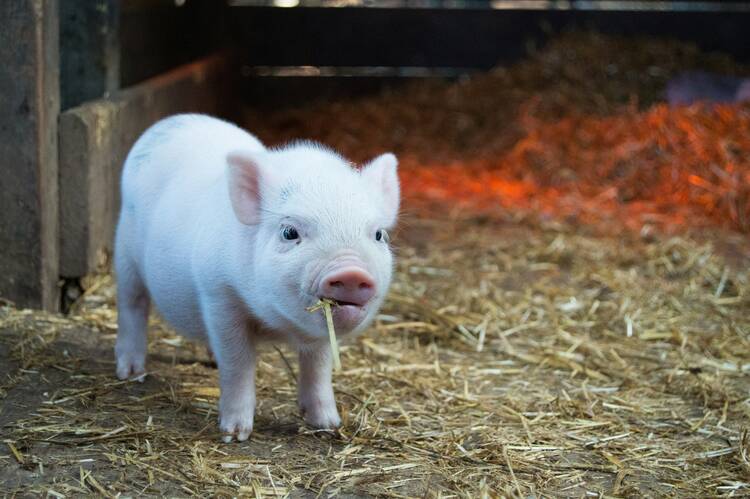We all feel like pigs sometimes.
By which I mean: filthy, uncouth, lacking dignity or grace. (As a disclaimer to pig lovers, I know that real pigs are fairly clean and intelligent; we’re talking about proverbial pigs here). Shame follows sin, and sometimes it’s so overpowering that it warps how we see ourselves. We’ve acted in ways unworthy of a human being and so, we think, maybe we’re really just animals.
I imagine this is how the Prodigal Son felt—penniless, alone and far from home—staring into the pig trough and considering digging in. Or St. Peter who, when he first met Christ, declared: “Depart from me, Lord, for I am a sinful man” (Lk 5:8). In our shame the line between sin and sinner evaporates. Sometimes that’s the first step towards true contrition, but it just as easily becomes a trap, holding us back from seeking reconciliation and forgiveness.
The protagonist of “Porco Rosso” (1992), written and directed by Hayao Miyazaki, feels like a pig all the time. But, in his defense, he is a pig.
Set in 1929, the film follows Porco Rosso (Michael Keaton in the 2005 American dub), a former Italian fighter ace working as a bounty hunter in the Adriatic Sea. Thanks to a curse, he has the head of a pig. His only friend is Gina (Susan Egan), the proprietor of an island hotel. When Porco’s custom red seaplane is shot down by an American rival—the swaggering Donald Curtis (Cary Elwes)—he brings it to his mechanic, Piccolo (David Ogden Stiers), in Milan for repairs, despite knowing that Mussolini’s government is hunting for him. There he meets Fio (Kimberly Williams-Paisley), Piccolo’s teenage granddaughter and a brilliant engineer. Despite Porco’s chauvinism, he soon comes to respect Fio’s skill, even if he can barely tolerate her optimism. She joins him on his return to the Adriatic to face Curtis, regain his honor and, perhaps, rediscover his humanity.
Porco is a pig literally and metaphorically: He’s rude, cocksure and a notorious womanizer. He holds anyone who might care for him, particularly Gina, at arm’s length. He performs daring rescues in the pirate-infested sea, but only if he gets paid. “I’m a pig,” he tells Fio. “I don’t fight for honor. I fight for a paycheck.” He nonetheless has a certain roguish charm, evoking Humphrey Bogart in “Casablanca” more than you might expect from an anthropomorphic pig.
But Porco’s boorish (boar-ish?) behavior hides his deep shame. In World War I, his entire squadron—including his best friend and Gina’s husband, Bellini—were killed in a dogfight. Porco (or Marco, then, before his transformation) was so focused on his own flying that he didn’t even notice his friends dying around him until he was alone. Afterward he experiences a haunting vision of his dead friends and enemies ascending into a ghostly parade of fighter planes sailing off into eternity, while he is left behind.
“God was telling you it wasn’t your time yet,” Fio says, when she hears the story.
“Seems to me,” Porco replies, “he was telling me maybe I was a pig and I deserved to be all alone.”
It’s implied that this event caused his transformation. Whether it was God’s punishment or his own shame becoming so powerful that it warped his features hardly seems to matter to Porco. Either way, he believes that he deserves it.
Fortunately, Porco has people who insist on seeing the good in him. Gina’s love for him is steady and quiet, and deeper than Porco realizes. She’s the only person who still calls him “Marco,” who believes that the man he once was isn’t lost forever. Fio holds him in high esteem; at first he thinks this is naïveté, but in truth it’s because Fio can see things in him that he can’t. Despite his protestations, she recognizes his courage and honor. (As an example, he refuses to fly for Mussolini’s Air Force: “I’d rather be a pig than a fascist.”)
Like Porco, we can all become so consumed by shame that we think our failures are all that matters. We feel like pigs so that’s the face we show the world, but in the end it’s just a mask that hides us from God and our need for reconciliation. It’s those times, when we feel most beastly, that we need friends who can remind us of our humanity.
“Porco Rosso” is streaming on Max.








